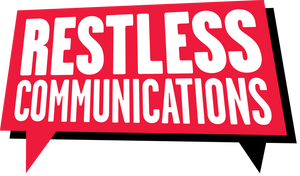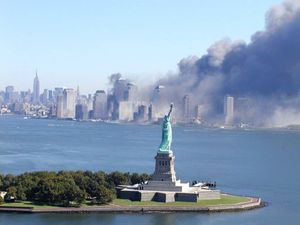Every generation has its defining moments.I thought the death of Princess Diana would be mine. But it wasn’t.
I first heard that a plane had crashed into one of the Twin Towers during lunch in the BBC canteen. One of my Press Office colleagues received a text. We thought it was a joke at first, a ploy to get us to return to work before our hour was up. The next text confirmed that it wasn’t.
We rushed back to room 2000, joining 20 or so others watching a bank of 16 or so TVs as pretty much one by one they started showing live coverage of the terrible events unfolding in New York. I was media relations manager for the BBC at the time, looking after BBC News in particular.
My first instinct was to check my New York-based brother in law was OK. By an incredible quirk of fate (or perhaps the credibility of dialing from the BBC Switchboard), I got through to his mobile straight away. He had been turfed off a subway train one stop away from the World Trades Centre (he worked next door), and was safe. I told him to head home, and immediately phoned his wife in Manhattan, who was blissfully unaware of what was unfolding, but grateful he was safe.
And then to work. A veritable hands on lesson in crisis communications, working alongside some extremely talented people – in particular Jon Steel, Mark Ogle and Donald Steel.
First stop was the BBC Newsroom. The strangest office atmosphere I have ever known. On the one hand, a recognition of what was happening and the professional (and the geo-political) implications for everyone there. On the other, no-one had been able to get hold of their colleague Stephen Evans, who we all knew was in the WTC for a meeting. His (estranged, I think) wife was in that newsroom staring at the screens imagining the worst.
But after an hour or two (or maybe it was just a few minutes) he managed to make contact with the newsroom, and went on to do a fantastic reporting job (as he recounts here). The atmosphere changed. Professionalism took over.
Back in the Press Office, in the middle of watching the events unfold, over the next couple of days and beyond, classic media relations and crisis communications skills kicked in. I remember being incredibly busy, telling Fleet Street that he was safe, and then later on (or was it the next day?) trying to convince US media – the NY Times I think – that the BBC breaking from rolling news to show Eastenders was not a ‘snub’. Thankfully, the story didn’t run.
A couple of days later I was on duty at home and watching *that* Question Time. As the programme went on I saw massive trouble approaching. The audience turned viciously on Philip Lader, former US Ambassador, who was on the panel, drawing an explicit link between American foreign policy and the attacks. It was too soon for that. And Dimbleby couldn’t calm them down.
The first call I had was from the Express, of all papers. And over the next few hours I dealt with the whole of Fleet Street. And then the full force of US media, as this crisis escalated up the BBC’s chain of command. The story only calmed down a couple of days (?!) later when Greg Dyke, DG at the time (who hadn’t watched it go out live), apologised.
And then we invaded Afghanistan.
In amongst trying to answer ridiculous questions (what hair spray were the female war correspondents using – they always looked immaculate?) Mark and I found ourselves defending Kate Adie in the Sun’s front page story (for giving away the PM’s flight plan), and then even more intense media criticism for John Simpson’s now infamous ‘liberation’ of Kabul. (I’d spoken to him via Satellite Phone pretty much every day the week before, to get the background on his incredible Burkha-disguised journey into and across Afghanistan – I’ve got immense respect for him, was delighted he won awards for his reporting, but as I’ve since told him, he would have made my life much easier if he just hadn’t ‘liberated’ Kabul so proudly.)
The world changed that day. Its a cliche but it’s true. Those attacks have defined this period of history.
I’d recently come back from 8 months travelling round the world, so was already fairly international in outlook. But I became instantly more-so. I also learned huge amounts professionally, about how to deal with crises in a press office. Today, more than any day since, I’m conscious of both of those things.
But strangely enough, I’m more conscious that if my brother in law had been on an earlier train 10 years ago today, he may not be with us here now.


